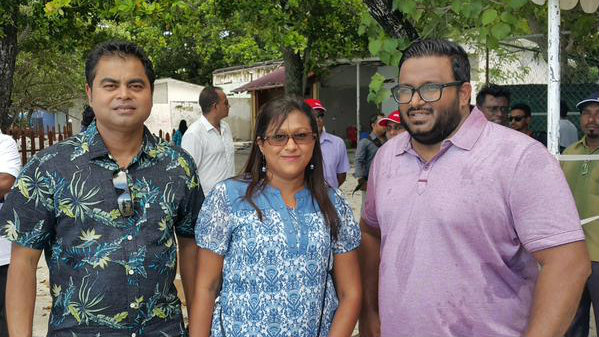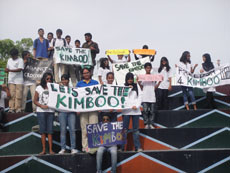Tourism minister Ahmed Adeeb has urged Maldivians to adapt to the impacts of climate change instead of considering relocation to higher ground abroad.
Maldivians will continue to live on Maldivian soil for the next 500 years, he said, at a festival held to mark the World Environment Day on Saturday.
“Maldives are innovative and always looking for new innovations. We will live here in the Maldives even if we have to reclaim land or live on floating contraptions,” he said.
The Maldivian islands lie just a meter above sea-level.
The UN Intergovernmental Panel on Climate Change (IPCC) in a 2013 report said global sea-level is rising and predicts accelerated rise for this century.
For high emissions, the IPCC now predicts a global rise by 52-98 cm by the year 2100, which would threaten the survival of coastal cities and island nations such as the Maldives.
Sea-level rise will be accompanied by coastal erosion, surface-flooding and saltwater intrusion into soil and groundwater, scientists have said. Climate change will also bring frequent and severe weather extremes and coral reef die-offs because of ocean warming and acidification.
Foreign minister Dunya Maumoon in a message on World Environment Day said: “The Maldives continues to take a proactive approach in building resiliency to the adverse impacts of climate change through pursuing a low carbon development strategy.”
President Abdulla Yameen has pledged to explore for oil in the Maldives.
Rubbish Island
In his speech, Adeeb also pledged to allocate a US$6 green tax – to be levied on tourists in November – to tackling waste management on Thilafushi Island, where garbage from Malé and resorts are sent.
“Tourists, who travel via air taxi, have asked if Thilafushi is a volcano, if volcanoes exist in the Maldives. I tell them that is not the case here and that I cannot give further details,” he said.
More than 200,000 tons of industrial and domestic waste were sent to Thilafushi in 2013, the most recent year for which statistics are available, according to government figures.
While some of the waste is sorted and sent to India, most is simply used as landfill or burned. Campaign groups have highlighted the risks to workers from toxic fumes and the contamination of surrounding lagoons by floating garbage.
The former Maldivian Democratic Party-led government had signed a contract with India-based Tatva Global Renewable Energy in 2011 to provide waste management services in and around Male, including establishing a system to generate power from recycling waste.
However, the current government of President Yameen cancelled that deal late last year, having previously sought to renegotiate it on “more mutually beneficial” terms.
Photo: social media

